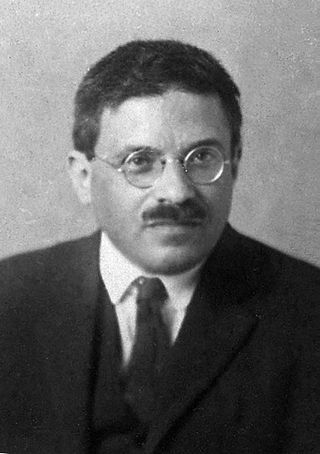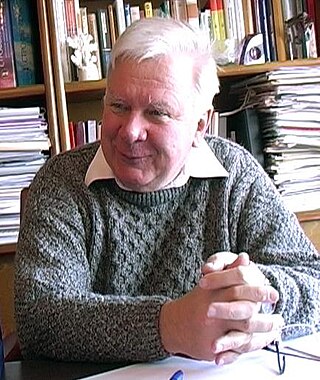The Dirac Medal or Dirac prize can refer to different awards named in honour of the physics Nobel Laureate Paul Dirac.

Paul Adrien Maurice Dirac was an English mathematical and theoretical physicist who is considered to be one of the founders of quantum mechanics and quantum electrodynamics. He is credited with laying the foundations of quantum field theory. He was the Lucasian Professor of Mathematics at the University of Cambridge, a professor of physics at Florida State University and the University of Miami, and a 1933 Nobel Prize in Physics recipient.

Paul Ehrenfest was an Austrian theoretical physicist who made major contributions to the field of statistical mechanics and its relations with quantum mechanics, including the theory of phase transition and the Ehrenfest theorem. He befriended Albert Einstein on a visit to Prague in 1912 and became a professor in Leiden, where he frequently hosted Einstein. He died by murder-suicide in 1933; he killed his disabled son Wassik, and then himself.
Michael Boris Green is a British physicist and a pioneer of string theory. He is a Professor of Theoretical Physics in the School of Physics and Astronomy at Queen Mary University of London, emeritus professor in the Department of Applied Mathematics and Theoretical Physics and a Fellow of Clare Hall, Cambridge. He was Lucasian Professor of Mathematics from 2009 to 2015.

Peter Goddard is a British mathematical physicist who works in string theory and conformal field theory. Among his many contributions to these fields is the Goddard–Thorn theorem.

Daniel Frank Walls FRS was a New Zealand theoretical physicist specialising in quantum optics.

Peter van Nieuwenhuizen is a Dutch theoretical physicist. He is a distinguished Professor at Stony Brook University in the United States. Widely known for his contributions to String theory, Supersymmetry, Supergravity and Field theory.

James Jeffrey Binney, FRS, FInstP is a British astrophysicist. He is a professor of physics at the University of Oxford and former head of the Sub-Department of Theoretical Physics as well as an Emeritus Fellow of Merton College. Binney is known principally for his work in theoretical galactic and extragalactic astrophysics, though he has made a number of contributions to areas outside of astrophysics as well.

Vladimir Evgen'evich Zakharov was a Soviet and Russian mathematician and physicist. He was Regents' Professor of mathematics at The University of Arizona, director of the Mathematical Physics Sector at the Lebedev Physical Institute, and was on the committee of the Stefanos Pnevmatikos International Award. Zakharov's research interests covered physical aspects of nonlinear wave theory in plasmas, hydrodynamics, oceanology, geophysics, solid state physics, optics, and general relativity.
John Lawrence CardyFRS is a British–American theoretical physicist. He is best known for his work in theoretical condensed matter physics and statistical mechanics, and in particular for research on critical phenomena and two-dimensional conformal field theory.
André Neveu is a French physicist working on string theory and quantum field theory who coinvented the Neveu–Schwarz algebra and the Gross–Neveu model.
The Australian Institute of Physics was established in 1963, when it replaced the Australian Branch of the British Institute of Physics based in London. The purpose of the institute is to promote the role of physics in research, education, industry and the community. The AIP publishes Australian Physics since 1963. Every two years, the Institute organises a national congress, the latest being held in December 2022 in Adelaide.
Đàm Thanh Sơn is a Vietnamese theoretical physicist working in quantum chromodynamics, applications of string theory and many-body physics.
Graham Paul Farmelo is a biographer and science writer, a Fellow at Churchill College, University of Cambridge, U.K., and an Adjunct Professor of Physics at Northeastern University, Boston, U.S.A. He is best known for his work on science communication and as the author of The Strangest Man, a prize-winning biography of the theoretical physicist Paul Dirac. He lives in London.
Arkady Vainshtein is a Russian and American Professor Emeritus of Theoretical physics who was awarded Pomeranchuk Prize (2005) and Sakurai Prize (1999) for theoretical physics.
The William I. Fine Theoretical Physics Institute is a research institute in the University of Minnesota College of Science and Engineering. FTPI was largely the work of physics Professor Emeritus, Stephen Gasiorowicz and university alumnus and Twin Cities real-estate developer William I. Fine. The institute officially came into existence in January 1987. FTPI faculty consists of six permanent members: Andrey V. Chubukov, Alex Kamenev, Keith Olive, Maxim Pospelov, Mikhail Shifman, and Boris Shklovskii. The institute has on Oversight Committee consisting of ten members. The Oversight Committee is the board of directors that make decisions concerning the staffing and budgeting of the institute.

The J. Robert Oppenheimer Memorial Prize and Medal was awarded by the Center for Theoretical Studies, University of Miami, from 1969, until 1984. Established in memory of US physicist J. Robert Oppenheimer, the award consisted of a medal, certificate and a $1000 honorarium. It was awarded for "outstanding contributions to the theoretical natural sciences [...] during the preceding decade". The acceptance speech for the inaugural award to Dirac was published as The Development of Quantum Theory (1971).
Bryan Ronald Webber, FRS, FInstP is a British physicist and academic. He was a Fellow of Emmanuel College, Cambridge from 1973 to 2010, and Professor of Theoretical Physics at the University of Cambridge from 1999 to 2010. He has been awarded the Dirac Medal by the Institute of Physics, the Sakurai Prize by the American Physical Society and the High Energy and Particle Physics Prize by the European Physical Society.
The Institute of Physics awards numerous prizes to acknowledge contributions to physics research, education and applications. It also offers smaller specific subject-group prizes, such as for PhD thesis submissions.
The Dirac Medal of the ICTP is given each year by the International Centre for Theoretical Physics (ICTP) in honour of physicist Paul Dirac. The award, announced each year on 8 August, was first awarded in 1985.
The Paul Dirac Medal and Prize is a gold medal awarded annually by the Institute of Physics for "outstanding contributions to theoretical physics". The award, which includes a £1000 prize, was decided upon by the Institute of Physics in 1985, and first granted in 1987.